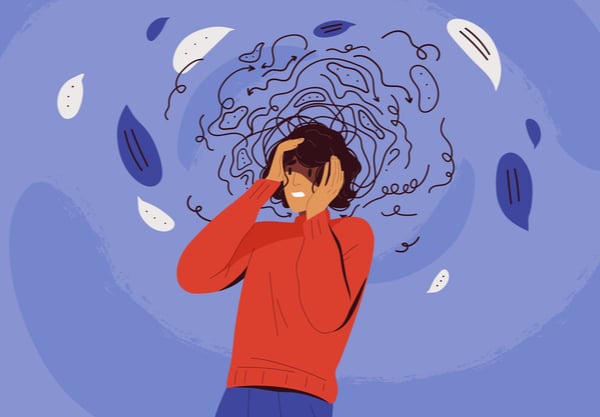Anxiety is an emotion that we feel in response to a threat or a potential threat. Often, it helps us out. For example, anxiety can motivate us to practice an upcoming presentation for class, take a step back when standing at the edge of a tall building, or prepare for an important occasion like meeting in-laws for the first time.
However, anxiety can become unmanageable and unhelpful.
It can cause physiological symptoms such as shortness of breath, racing heart, and shakiness. Anxiety can also cause us to change our behavior. For example, we may frequently check that the front door is locked or avoid doing things we want or need to do (e.g., speak up in a work meeting). Finally, it can impact our thoughts such as worrying about things that could happen in the future like trouble paying bills or upcoming social events.
These anxiety-related symptoms can capture and maintain our attention, and make it harder to focus on the task at hand. When anxiety has reached the level that it feels unmanageable or difficult to control, it can make the very things we are anxious about more difficult. For example, when anxious during a presentation at school, we may begin to feel ourselves sweat and shake. Soon, all we can focus on are the physiological symptoms we are experiencing and the thought, “everyone must be noticing how anxious I am right now.” We may decide to cut the presentation short, which may temporarily relieve the anxiety but teach us that we couldn’t handle that experience, making it harder the next time around.
This situation is just one example of how anxiety can cause cognitive problems, such as difficulty focusing, remembering important details, and making decisions. Some experience anxiety in social situations and can have thinking difficulties when around new or influential people, such as coworkers or a boss, or when anticipating being in that situation. Others feel anxious in relation to a traumatic or stressful event that occurred in the past and may have difficulty focusing when thoughts of the event arise and/or in response to specific reminders of the event. For some, anxious thoughts are nearly constant, and may generalize to just about any stressful situation that could arise such as worry about losing loved ones or becoming ill.
If you have anxiety along with other conditions, such as: trouble sleeping, depression, attention deficit hyperactivity disorder (ADHD), chronic pain, traumatic brain injury (TBI), and/or alcohol and substance use, that can have a negatively compounding effect on cognitive functioning. Imagine that your ability to think (e.g., memory, attention, problem solving) is a pie, and each of these conditions represent a piece. If you have anxiety, it eats a piece of the pie. ADHD eats up another one. Poor sleep eats up another one. Pain eats up another one. Then you are left with only a couple pieces to get through the day—whether it be work, school, and/or caring for loved ones—it just doesn’t seem like enough!
Here is the good news. There are many great strategies to help manage anxiety including breathing techniques and mindfulness, physical activity, and engaging in self-care. That being said, sometimes anxiety and related conditions are too much to manage on our own. Seeing a clinician can be really helpful as a guide through these techniques and to provide treatments that have been shown to improve anxiety and cognitive abilities in large-scale studies. Clinicians at PNBC provide psychotherapy to individuals with anxiety and commonly co-occurring conditions who may be experiencing cognitive difficulties in their everyday life.
Written by Sarah Jurick, Ph.D. Dr. Jurick is a neuropsychologist at Pacific Neurobehavioral Clinic, PC.

